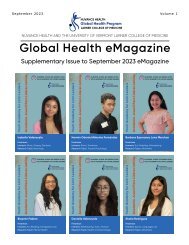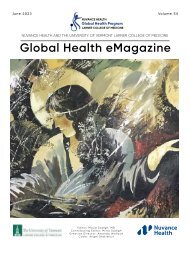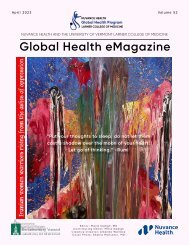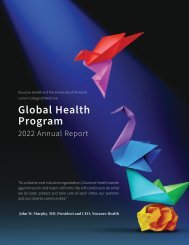eMagazine December 2022
You also want an ePaper? Increase the reach of your titles
YUMPU automatically turns print PDFs into web optimized ePapers that Google loves.
OUR PEOPLE,<br />
OUR MISSION<br />
Global Health<br />
<strong>eMagazine</strong><br />
<strong>December</strong> <strong>2022</strong><br />
Perspective<br />
Highlights<br />
Welcome<br />
Congratulations<br />
Article of the Month<br />
Video of the Month<br />
Ebola in Uganda<br />
Decolonization<br />
Innovation and Technology<br />
Among the Letters<br />
Nursing Division<br />
Art to Remind Us of Who<br />
We Can Be<br />
Reflections<br />
Our Beautiful Planet<br />
Upcoming Grand Rounds<br />
New Publication<br />
Global Health Family<br />
have argued that solutions and programs to the issue of empowerment often<br />
have failed to address underlying structural imbalances of power, hiding the<br />
existing gender, economic, and political inequalities as opposed to challenging<br />
them. While issues regarding women’s empowerment are present globally, this<br />
issue is pertinent to LMICs due to imbalances in the economic and political<br />
sectors that are caused by historical and contemporary processes such as<br />
colonization, capitalism, and globalization (Medie et al., 2018).<br />
There are three arguments for women’s equal representation: formal, descriptive<br />
and substantive. The most basic argument is formal representation, meaning<br />
that women have the same legal right as men to participate in politics; however,<br />
this requires that all barriers to women’s participation in decision-making be<br />
removed, eradicating the discrimination of women in the area of poltics.<br />
Descriptive representation means there must be a descriptive similarity between<br />
the representative and constituents. Essentially saying, because women make<br />
up 50% of the population, they should also make up 50% of government officials.<br />
Substantive representation, or symbolic representation, is the argument that<br />
simply the presence of women in power is important and creates the feeling of<br />
being fairly or effectively represented. However, this argument does not consider<br />
the other identities, such as race, ethnicity, religion, etc, that are needed for<br />
equal and fair representation of entire populations (Paxton et al., 2021).<br />
It is extremely important to increase the representation of women in positions of<br />
power. Individuals who hold office are able to decide how to allocate potentially<br />
scarce resources, as well as decide which issues are addressed first. Politicians<br />
often are forced to make decisions that help some people while hurting<br />
others. These decisions can also affect an individual’s choice and behavior<br />
by encouraging some and outlawing others. Politicians also hold power over<br />
social institutions, such as family and education. When women are not equally<br />
represented, or represented at all, issues that pertain to and affect them primarily<br />
go unaddressed. This leads to further inequalities in women’s day-to-day lives,<br />
as well as affecting them in the long-term (Paxton et al., 2021).<br />
References<br />
Medie, P. A., & Kang, A. J. (2018). Power, knowledge and the politics of gender<br />
in the Global South, European Journal of Politics and Gender, 1(1-2), 37-54.<br />
Retrieved Nov 16, <strong>2022</strong>, from https://bristoluniversitypressdigital.com/view/<br />
journals/ejpg/1/1-2/article-p37.xml<br />
Paxton, P., Hughes, M., & Barnes, T. (2021). Women, politics, and power: A global<br />
perspective. Rowman & Littlefield.<br />
Calendar<br />
Photo Gallery<br />
Resources<br />
23

















